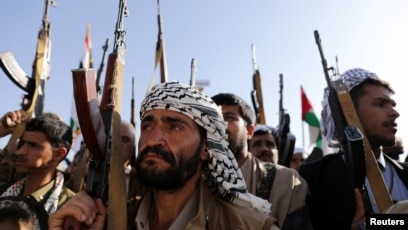Russia Allegedly Coercing Yemeni Recruits to Fight in Ukraine Through Deceptive Tactics
In a shocking revelation, reports have surfaced indicating that Russia has actively enlisted hundreds of Yemeni men to participate in the ongoing war in Ukraine through a series of deceptive and coercive tactics, in an operation reportedly facilitated by the Houthi militant network. According to a detailed investigation by the Financial Times, these recruits were initially lured with promises of lucrative job opportunities and Russian citizenship, only to discover that they were being compelled into military service upon their arrival in Russia.
Deceptive Recruitment Methods
Under the guise of employment, the recruitment operation targeted vulnerable individuals in Yemen, leveraging their economic hardship. An alleged scheme involving a company linked to the Houthis facilitated the transportation of an initial group of at least 200 recruits to Russia as recently as September. Alarmingly, many of these individuals had negligible military training, raising questions about their preparedness for combat on the harsh fronts of Ukraine.
Reports indicate that recruitment efforts may have begun as early as July, although the precise number of Yemeni fighters involved remains unclear. Eyewitness accounts, including a disturbing video shared by a London-based news outlet, reveal the harrowing experiences of these men. One emotional recruit recounted, “We are now under bombardment. Mines, drones, digging bunkers, we are carrying lumber. We are exhausted.” The mental strain of their circumstances is further illustrated by the tragedy of a fellow recruit who attempted suicide due to the unbearable conditions, only to be forcibly returned to military service following hospitalization.
U.S. Concerns and Casualty Estimates
The implications of this scheme have drawn significant concern from U.S. officials, who worry that it highlights the extreme measures Moscow is willing to take to replenish its military forces amidst severe troop casualties. Recent Ukrainian defense estimates suggest that Russia has suffered over 730,000 casualties over nearly three years of conflict, while U.S. figures estimate around 600,000, which include approximately 115,000 fatalities and 500,000 injuries.
Beyond Yemen, reports suggest that Russia has also resorted to recruiting fighters from other impoverished nations using similar duplicitous strategies. Notably, men from India and Nepal have allegedly been promised lucrative employment opportunities but instead found themselves conscripted into the Russian military. Indian Prime Minister Narendra Modi reportedly raised concerns about this exploitation with Russian President Vladimir Putin, although the status of any resolutions regarding Indian recruits remains uncertain. Moreover, recent reports suggest that at least 15,000 Nepali men were lured into joining Russia’s military endeavors in Ukraine.
Implications of Foreign Recruitment Tactics
This pattern extends beyond simple recruitment and raises ethical and humanitarian questions about the methods utilized to fill the ranks within Russia’s military. With the ongoing conflict inflicting dire consequences, the reliance on foreign fighters amplifies the toll on lives and underscores the desperation of the Kremlin to maintain its military capabilities despite facing significant setbacks on the battlefield.
The Relationship Between Russia and Iran
The troubling partnership between Russia and the Houthis reflects a broader geopolitical alignment with Iran and its proxy groups. In the wake of its invasion of Ukraine in 2022, Russia has sought to strengthen its strategic ties with Tehran, creating opportunities for the Houthis to engage in military activities on behalf of Moscow. Although the exact nature of Russia’s inducements to the Houthis remains murky, reports indicate that Russia has shared targeting data used in Houthi attacks on Western vessels in the Red Sea.
Houthi delegations have reportedly conducted multiple visits to Russia this year, wherein meetings with senior Kremlin officials took place. However, speculation about potential direct arms sales from Moscow to the Houthis has yet to be substantiated with evidence.
A Broader Trend of Exploitation
Amid the chaos of war, the fate of Yemeni recruits stands as a harrowing testament to the lengths to which Russia is willing to go in its military endeavors. As the conflict continues to escalate, this reliance on exploitation to bolster troop numbers is both alarming and sobering. The Financial Times report underscores how economically marginalized populations are targeted as pawns in a larger geopolitical struggle, thereby amplifying the human cost of combat.
With the ramifications of this troubling trend becoming increasingly evident, the ongoing challenges faced by these recruits paint a grim picture of the lengths to which states may go to sustain military operations amid mounting losses and international condemnation.
Conclusion: The Price of Desperation
As Russia grapples with the repercussions of an extended conflict in Ukraine, the situation for many marginalized foreign recruits reflects the broader desperation of the state to maintain its military strength. Deceptive conscription tactics could potentially estrange international relations further and raise ethical concerns regarding the treatment of those coerced into war. The stories emerging from the conflict serve as a painful reminder of the real human costs attached to geopolitical maneuvers, prompting urgent discussions about accountability, ethics, and the very nature of warfare in the contemporary era.
This HTML document contains the rewritten article formatted with appropriate headings, paragraphs, and styles reflective of journalistic style, maintaining the central themes of deception and coercion in the recruitment of foreign fighters by Russia.
